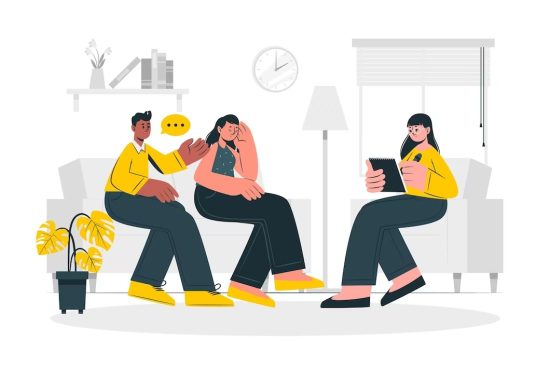
Often, when we feel overwhelmed in our day to day lives, we wish to share our feelings, thoughts and perspectives with people who are part of our lives. We share these for several reasons – to feel validated, to find an emotional release, to ‘sort things out’ as we speak, and so on
Underlying many of these reasons is the need to be understood. However, sometimes it feels like they have misunderstood us, or have not completely understood. The feeling of being constantly misunderstood by people close to us can deeply impact us.
How it feels to be misunderstood

Despite repeated attempts to share feelings, if people don’t seem to understand, it can make you feel helpless, impatient, and angry at the listener. You may even wonder if they are putting enough effort to understand you. This could leave you with a deep sense of hurt and resentment, stirring up a sense of loneliness. Eventually, you may even stop trying to explain
As things get piled under the carpet, a sense of disconnect with others may grow. Ironically, you may push people away, while needing them to understand you at the same time. This could harm relationships with significant persons, by confusing and scaring them.
Why We Feel Misunderstood
There could be many reasons why we feel misunderstood. The following section explores a few of these reasons.
Sometimes, people may not know how to console you. This lack of knowledge may make them say and do things for you, leaving you feeling misunderstood, as illustrated below.
- Trivializing problems: People may not see the intensity of your feelings, and ask you to brush it under the carpet, by suggesting that there are bigger problems in the world, and that you should feel thankful to not have those. For instance, they may say, as long as you have a roof over your head and food in your plate, you should not complain. This can be infuriating, giving rise to the feeling of being misunderstood.
- Humour: Quite often, when they don’t know how to help you, people use humour to distract you. They may encourage you to look at the lighter side of life, or worse off, even joke about your misery. This can be extremely frustrating, worsening the feeling of being misunderstood.
Apart from their lack of knowledge, there are few other reasons why people’s attempts at consolation don’t reach us, making us feel misunderstood.
- Their involvement in your problems: The important people in your life may be intertwined in your problems. So, they may find it hard to hear your problems, without being affected themselves. In conflicts, sharing your perspective is often seen as a personal attack on them. Sometimes when children share their troubles, parents interpret it as criticism, rather than a sharing of feelings. Empathizing with your concerns can be hard for people, thus intensifying your feeling of being misunderstood.
- People’s own concerns: Often, when you share feelings, people relive your troubles, and experience your pain. It may also remind them of their own problems. Tolerating their own anxiety may then be very difficult. So, they may ask you to ‘get over it’, ‘forget it’, ‘let it go’, as they are in fact trying to shed their own discomfort. This can further deepen your sense of being misunderstood.
What We Can Do When We Feel Misunderstood

Feeling misunderstood can thus have so many underlying causes, and can impact us in so many ways. While it can leave us feeling hopeless and beyond help, there are ways in which we can cope with this feeling. Following are some examples of the same:
- Time off: When infuriated by a misunderstanding, perhaps the most immediate thing that can be done is to take time off. It may be beneficial to leave the space, rather than lashing out, and in turn, worsening the conflict. This time can be used to ponder about the reasons for feeling misunderstood, and to know its impact on us. This may keep us from reacting harshly, under the influence of anger and sadness.
- Guide people: As mentioned, a lack of knowledge can prevent people from supporting us desirably. We can guide them on how to help us feel understood. We could tell them what we want, when sharing our concerns – do we want them to just listen, or tell us that our concerns are valid, or know their opinion on something? This explanation could entail simple behavioural requests:
- I would like you to listen to me, without interrupting/ passing judgments/asking me to forget it/ making light of the situation.
- I would like you to tell me what you think about this situation.
- I would really like your advice regarding this decision.
Alternatively, we could also try different ways to reach out and feel understood – writing letters, seeking therapy, and so on.
- Expanding network: Often, we expect one person to constantly understand and help us through all our problems. This could be difficult, no matter how close they are to us. It is beneficial to find different avenues, or more people, who could comprehend our problems. If we feel misunderstood by one person, we still have other sources to explore, to feel understood and validated.
- Receiving support in different ways: It helps to believe that generally, people want to be considerate; they just show it in different ways. For instance, you may have different needs at different times; sometimes, you need someone to distract you from problems; occasionally, you need someone to just listen; at times, you want them to run errands. Different people in life may support differently. Some patiently listen, others take us shopping, for a movie, or even plan a trip; few may help by doing chores for you, like cooking for you. All these may be ways of acknowledging that they have understood what you need in that moment. Just as it is valuable to widen your support network, it may also help to expand your possibility of receiving help in ways that people are willing to offer.
- Accepting feeling misunderstood: Reminders to self can come in handy, that you do not have to explain yourself all the time. You could try to consciously accept the fact that sometimes people will misunderstand you, despite your explanations. This may remove the pressure of finding ways to constantly clarify things for them.
Here's a Guided Meditation on Staying with a Difficulty
There is a lot of value in staying with the discomfort and resisting the urge to fix everything. Difficult emotions can tell us a lot if we look at them with curiosity!
Frequently Asked Questions
Feeling misunderstood can result from various factors such as differences in communication styles, unexpressed emotions, and past experiences that affect how we interpret messages. A lack of active listening and empathy from others can also contribute to feeling misunderstood.
Difficulty expressing emotions is common. In therapy, you can explore the root causes of this challenge and learn healthier ways to communicate emotions, such as through journaling or creative expression.
About the Author
This article was written by Inner Space Team. This post was consulted & approved by professional therapists practicing online therapy and counseling.
Ask a Therapist
If you are interested to know more about relationships and other mental health topics, ‘Ask A Therapist’ is a platform for you to ask your questions related to Mental Health, Mindfulness & Emotional Well-Being to our team of qualified Therapists.




